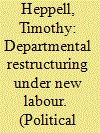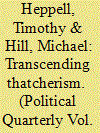| Srl | Item |
| 1 |
ID:
107208


|
|
|
|
|
| Publication |
2011.
|
| Summary/Abstract |
Despite their emphasis on joined up government, which was to be one of the defining features of the New Labour governing project, attempts to enhance policy delivery would also result in major departmental restructuring within each of their three terms in office. This article asks three questions with regard to the New Labour and departmental restructuring. First, from a historical comparative perspective was there a greater degree of departmental restructuring under New Labour than under previous governments? Second, in the case of New Labour what was the motivation for departmental restructuring? Finally, was New Labour characterised by successful departmental restructurings? Utilising select committee material for the views of civil servants and combining this with questionnaire feedback from former New Labour ministers this article seeks to address these questions to assess the record of departmental restructuring in the New Labour era.
|
|
|
|
|
|
|
|
|
|
|
|
|
|
|
|
| 2 |
ID:
092409


|
|
|
|
|
| Publication |
2009.
|
| Summary/Abstract |
This paper examines the voting motivations of Conservative parliamentarians in the final parliamentary ballot of the Conservative Party leadership election of 2005. By constructing a data set of the voting behaviour of Conservative parliamentarians in the final parliamentary party ballot, and by determining the ideological disposition of the 2005 PCP this paper examines the ideological disposition of the candidates' vis-à-vis their electorate. The paper identifies the increasing Thatcherite nature of the PCP across three dominant ideological divides of contemporary British Conservatism-economic, European, and social, sexual and moral policy. Through such an analysis the paper demonstrates how the modernising David Cameron, who came first in the final parliamentary ballot and then won the membership ballot, transcended the traditional ideological voting motivations of candidates' vis-à-vis their electorate. Most significantly, the paper demonstrates that the European ideological policy divide was not a factor in the succession contest, unlike the succession contests of 1990, 1997 and 2001.
|
|
|
|
|
|
|
|
|
|
|
|
|
|
|
|
| 3 |
ID:
111663


|
|
|
|
|
| Publication |
2012.
|
| Summary/Abstract |
The decision of the Conservative-dominated coalition to ring-fence international development spending has been, given the economic environment, one of most intriguing decisions of the new government. Recognising the relative neglect of academic work on Conservative policy towards international development, the article seeks to provide an explanation for its new-found prioritisation. In doing so, the article suggests that it can be attributed to four possible influences: that it can be tied to the process of modernisation and brand decontamination of the Conservatives; that it is a consequence of the personal commitment of key elites such as David Cameron, George Osborne and Andrew Mitchell; that it is by-product of the perceived success of the Department for International Development under New Labour, which made subsuming it within the Foreign and Commonwealth Office a non-viable (and expensive) option; and that protecting the international aid budget was actually in the British national interest.
|
|
|
|
|
|
|
|
|
|
|
|
|
|
|
|